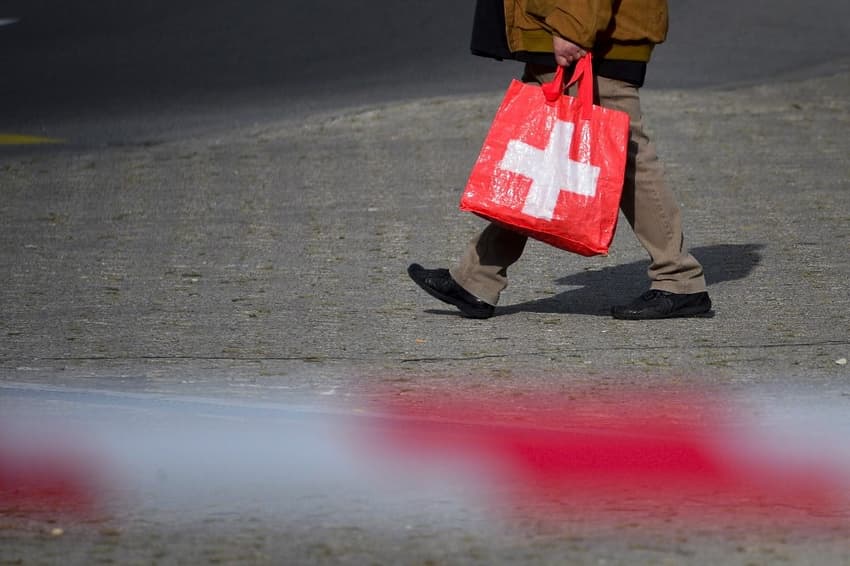Six essential tips that will save you money in Switzerland

It’s no secret that life in Switzerland comes with a hefty price tag. But there are some ways to save on costs to make Swiss life less expensive.
On average, a person working in Switzerland earns 6,789 francs per month – the third highest salary globally with only Monaco and Bermuda workers faring better. On the other hand, Switzerland also has very high living costs which particularly affect people on lower incomes. For example, a household with a gross income of 9,817 francs per month will spend around 14.4 percent on housing and energy alone, with a whopping 46.5 percent of the salary going towards consumer spending.
So thinking of ways to save money goes a long way. Here are a few everyday spending hacks to help make your life in Switzerland a little less expensive.
Get a train ride
One of the easiest ways to save money on transport in Switzerland is to use its affordable train network which connects around 2,600 stations and stops across the country – meaning you can easily forgo cars altogether. This will not only save you a lot of money on gas but also helps you protect the environment by travelling greener. Two birds!
With SBB CFF FFS, you can pay for “Sparbillette” - or so-called Supersaver tickets – and benefit from an up to 70 percent discount on the standard ticket price. Travellers can choose from one-way tickets to day passes but will be limited to a few select routes and times. The trick is to book as early as possible to snag the best deal.
OPINION: Trains in Switzerland are excellent, so why are cars still king?
For frequent travellers, SBB’s GA Travelcard at an annual cost of 3,860 francs for adults is your most cost-effective option by a landslide. The travelcard allows you to travel on public transport throughout Switzerland for “free” and you can even get 5 francs off on short-term bike rentals at 20 SBB stations.
If you don’t want to hand over quite that much money, a great way of reducing your transport cost is to purchase SBB’s Half Fare Travelcard. The travelcard costs 120 francs per year and gives you an up to 50 percent discount on all travel by train, bus, boat, and most mountain railways.

A logo of the Swiss Federal Railways (SBB / CFF) is reflected on a locomotive at the Zurich's main train station on November 8, 2022. (Photo by Fabrice COFFRINI / AFP)
Carpooling
However, relying solely on trains as your means of transport isn’t always convenient. Still, there are ways to bring down cost even if the odd car ride is on your agenda. One way of doing this is by speaking to family members, friends, colleagues or flatmates and organising joint car rides to the same destination.
There are also many businesses in Switzerland that will let you find carpooling opportunities in your area should you not have anyone to share a ride with, such as IDOSH, FAHRPOOL, HitchHike and BlaBlaCar.
Food and beverages
In Switzerland, people spend around 6 percent of their monthly average disposable income on food and non-alcoholic drinks and around 3.5 per cent on eating out and accommodations. With a monthly gross income of 9,817 francs, around 640 francs are spent on food and a further 285 francs on restaurants and similar establishments – not an insignificant amount!
The best tip to quickly bring down your food bill is to start meal prepping. While eating the same meal seven days in a row may not appeal to everyone - but would save you the most money – you can also start by writing down the meals you plan on cooking throughout the week. This allows you to not only be more conscious of what ingredients you buy (such as vegetables) and when you plan on using them, but it will also prevent food waste.
Speaking of food waste, another great way of saving the odd franc is to download the app Too Good To Go and purchase one of their surprise food packages at a reasonable price. The company sources fresh food which would otherwise be wasted in cafes, restaurants, and shops, simply due to not being sold on time.
 Photo by Bozhin Karaivanov on Unsplash
Photo by Bozhin Karaivanov on Unsplash
A tip to help you make the most of your money - even if planning ahead is replaced by the occasional impulse purchase - is to get a customer card, such as Coop’s Supercard or MIgros’s Cumulus card, from your local grocery shop and start turning points into money.
READ ALSO: 8 ways to save money on groceries on Switzerland
Compare before committing
It is a well known fact that insurance-related expenses in Switzerland make up a large chunk of your monthly expenses. In 2023, for instance, health insurance premiums averaged 4,766 francs across all basic insurance models, franchise providers and age groups. This corresponds to a monthly premium of 334.70 francs. Compared to 2022, premiums have increased by 6.6 percent. But with around 200 insurance providers throughout Switzerland, it can be tricky to know where to get the best deal.
Whether you have newly moved to Switzerland or are looking to get a better deal on your insurance, it is smart to have a glimpse at one of the many comparison websites on offer to ensure you don’t overpay for your medical, mortgage, telecom, or car insurance needs. Comparis, moneyland, insurando and krankenkassenvergleich are some of the best websites to get you started.
Save on taxes
Let’s face it: not many a Swiss resident looks forward to filling out their yearly tax declaration. Nevertheless, it is essential that you keep hold of your receipts throughout the year and carefully fill in all details as turning a blind eye could mean missing out on valuable money-saving opportunities.
In Switzerland, you can save money on taxes by choosing to pay some of your income into the third pillar. The money you pay into pillar 3a can then be deducted from your annual taxes. In 2023, employees with a pension fund insurance can pay up to 7,056 francs into pillar 3a.
An example: a single, 50-year-old Roman Catholic pension saver with a taxable income of 80,000 francs and access to a pension fund saves around 1,702 francs in taxes in the city of Lucerne if he pays in the maximum amount into pillar 3a.
Self-employed people can deduct up to 20 percent of their earned income, equating to a maximum 35,280 francs in 2023. In order not to miss out on the tax advantages, it is worth transferring the money at the beginning of the year.
READ ALSO: Everything that changes in Switzerland in March 2023

Photo by Claudio Schwarz on Unsplash
Housing
Rising interest rates fuelled by economic uncertainty has meant renting a home is cheaper than buying in Switzerland for the first time in 15 years, a new study has found, but that doesn’t mean that renting in Switzerland is cheap. Still, there are ways around forking out a small fortune on rent cost.
If you’re not fussy about sharing your space, co-living is likely your best bet to slash rental costs fast. You can find a list of co-living companies on coliving.com.
Another alternative is to rent outside the city centre and find an apartment in a small town or rural rea of the country. In fact, thanks to Switzerland’s reliant public transport links, smaller towns don’t mean reduced transport connections. Olten, Aarau and Baden are just a few examples of well-connected towns with great transport links – and more affordable rents.
Those renting in Zurich specifically may also want to consider committing to an apartment long-term. According to a publication by the Statistical Office of the Canton of Zurich, households that have not changed residence for a long time pay less rent than those who move around. This because households opting to move out of their residence have often not lived in their apartments very long and therefore already pay higher rent prices.
READ ALSO: Zurich hit by affordable housing shortage amid record high immigration
As a result, the rent cost for the subsequent vacant apartments is already significantly higher than those apartments in long-term rents. Hence the reason why those moving in will also pay a higher rent price.
As a general tip, it makes more sense to commit to an apartment longer term if you are looking to save money on rent.
Comments
See Also
On average, a person working in Switzerland earns 6,789 francs per month – the third highest salary globally with only Monaco and Bermuda workers faring better. On the other hand, Switzerland also has very high living costs which particularly affect people on lower incomes. For example, a household with a gross income of 9,817 francs per month will spend around 14.4 percent on housing and energy alone, with a whopping 46.5 percent of the salary going towards consumer spending.
So thinking of ways to save money goes a long way. Here are a few everyday spending hacks to help make your life in Switzerland a little less expensive.
Get a train ride
One of the easiest ways to save money on transport in Switzerland is to use its affordable train network which connects around 2,600 stations and stops across the country – meaning you can easily forgo cars altogether. This will not only save you a lot of money on gas but also helps you protect the environment by travelling greener. Two birds!
With SBB CFF FFS, you can pay for “Sparbillette” - or so-called Supersaver tickets – and benefit from an up to 70 percent discount on the standard ticket price. Travellers can choose from one-way tickets to day passes but will be limited to a few select routes and times. The trick is to book as early as possible to snag the best deal.
OPINION: Trains in Switzerland are excellent, so why are cars still king?
For frequent travellers, SBB’s GA Travelcard at an annual cost of 3,860 francs for adults is your most cost-effective option by a landslide. The travelcard allows you to travel on public transport throughout Switzerland for “free” and you can even get 5 francs off on short-term bike rentals at 20 SBB stations.
If you don’t want to hand over quite that much money, a great way of reducing your transport cost is to purchase SBB’s Half Fare Travelcard. The travelcard costs 120 francs per year and gives you an up to 50 percent discount on all travel by train, bus, boat, and most mountain railways.

Carpooling
However, relying solely on trains as your means of transport isn’t always convenient. Still, there are ways to bring down cost even if the odd car ride is on your agenda. One way of doing this is by speaking to family members, friends, colleagues or flatmates and organising joint car rides to the same destination.
There are also many businesses in Switzerland that will let you find carpooling opportunities in your area should you not have anyone to share a ride with, such as IDOSH, FAHRPOOL, HitchHike and BlaBlaCar.
Food and beverages
In Switzerland, people spend around 6 percent of their monthly average disposable income on food and non-alcoholic drinks and around 3.5 per cent on eating out and accommodations. With a monthly gross income of 9,817 francs, around 640 francs are spent on food and a further 285 francs on restaurants and similar establishments – not an insignificant amount!
The best tip to quickly bring down your food bill is to start meal prepping. While eating the same meal seven days in a row may not appeal to everyone - but would save you the most money – you can also start by writing down the meals you plan on cooking throughout the week. This allows you to not only be more conscious of what ingredients you buy (such as vegetables) and when you plan on using them, but it will also prevent food waste.
Speaking of food waste, another great way of saving the odd franc is to download the app Too Good To Go and purchase one of their surprise food packages at a reasonable price. The company sources fresh food which would otherwise be wasted in cafes, restaurants, and shops, simply due to not being sold on time.

A tip to help you make the most of your money - even if planning ahead is replaced by the occasional impulse purchase - is to get a customer card, such as Coop’s Supercard or MIgros’s Cumulus card, from your local grocery shop and start turning points into money.
READ ALSO: 8 ways to save money on groceries on Switzerland
Compare before committing
It is a well known fact that insurance-related expenses in Switzerland make up a large chunk of your monthly expenses. In 2023, for instance, health insurance premiums averaged 4,766 francs across all basic insurance models, franchise providers and age groups. This corresponds to a monthly premium of 334.70 francs. Compared to 2022, premiums have increased by 6.6 percent. But with around 200 insurance providers throughout Switzerland, it can be tricky to know where to get the best deal.
Whether you have newly moved to Switzerland or are looking to get a better deal on your insurance, it is smart to have a glimpse at one of the many comparison websites on offer to ensure you don’t overpay for your medical, mortgage, telecom, or car insurance needs. Comparis, moneyland, insurando and krankenkassenvergleich are some of the best websites to get you started.
Save on taxes
Let’s face it: not many a Swiss resident looks forward to filling out their yearly tax declaration. Nevertheless, it is essential that you keep hold of your receipts throughout the year and carefully fill in all details as turning a blind eye could mean missing out on valuable money-saving opportunities.
In Switzerland, you can save money on taxes by choosing to pay some of your income into the third pillar. The money you pay into pillar 3a can then be deducted from your annual taxes. In 2023, employees with a pension fund insurance can pay up to 7,056 francs into pillar 3a.
An example: a single, 50-year-old Roman Catholic pension saver with a taxable income of 80,000 francs and access to a pension fund saves around 1,702 francs in taxes in the city of Lucerne if he pays in the maximum amount into pillar 3a.
Self-employed people can deduct up to 20 percent of their earned income, equating to a maximum 35,280 francs in 2023. In order not to miss out on the tax advantages, it is worth transferring the money at the beginning of the year.
READ ALSO: Everything that changes in Switzerland in March 2023

Housing
Rising interest rates fuelled by economic uncertainty has meant renting a home is cheaper than buying in Switzerland for the first time in 15 years, a new study has found, but that doesn’t mean that renting in Switzerland is cheap. Still, there are ways around forking out a small fortune on rent cost.
If you’re not fussy about sharing your space, co-living is likely your best bet to slash rental costs fast. You can find a list of co-living companies on coliving.com.
Another alternative is to rent outside the city centre and find an apartment in a small town or rural rea of the country. In fact, thanks to Switzerland’s reliant public transport links, smaller towns don’t mean reduced transport connections. Olten, Aarau and Baden are just a few examples of well-connected towns with great transport links – and more affordable rents.
Those renting in Zurich specifically may also want to consider committing to an apartment long-term. According to a publication by the Statistical Office of the Canton of Zurich, households that have not changed residence for a long time pay less rent than those who move around. This because households opting to move out of their residence have often not lived in their apartments very long and therefore already pay higher rent prices.
READ ALSO: Zurich hit by affordable housing shortage amid record high immigration
As a result, the rent cost for the subsequent vacant apartments is already significantly higher than those apartments in long-term rents. Hence the reason why those moving in will also pay a higher rent price.
As a general tip, it makes more sense to commit to an apartment longer term if you are looking to save money on rent.
Join the conversation in our comments section below. Share your own views and experience and if you have a question or suggestion for our journalists then email us at [email protected].
Please keep comments civil, constructive and on topic – and make sure to read our terms of use before getting involved.
Please log in here to leave a comment.